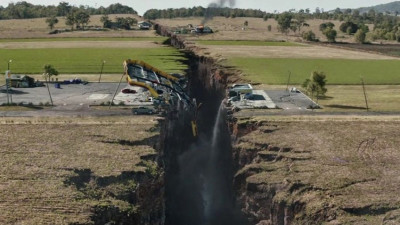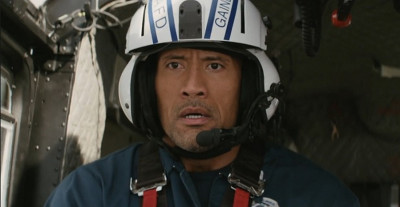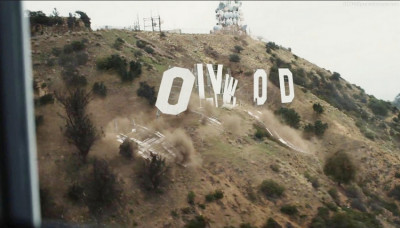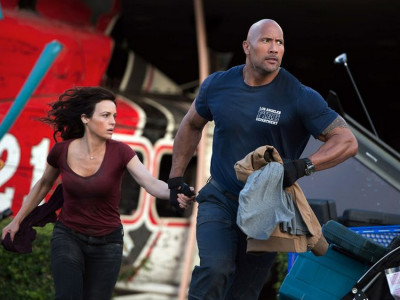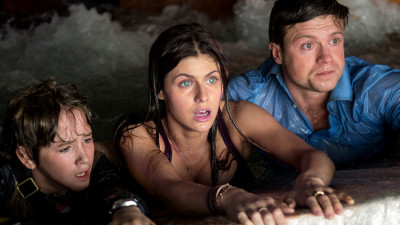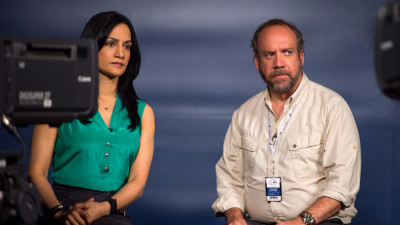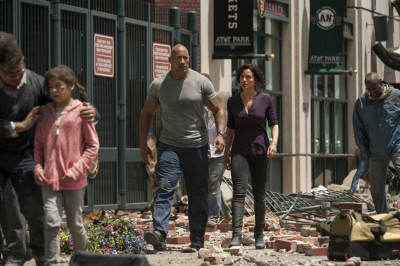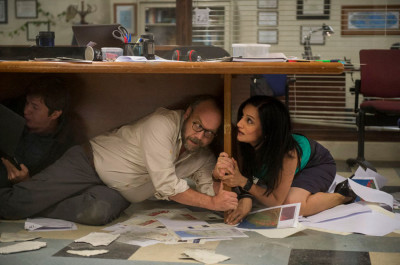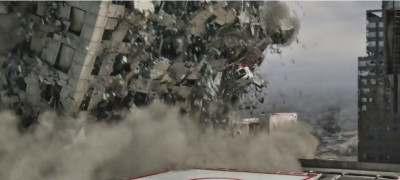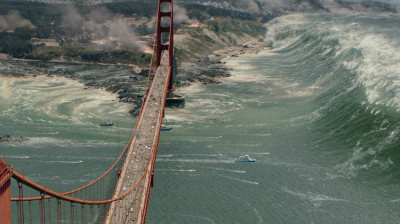While I never wish ill on anyone or anything (except perhaps an annoying sibling or two), if “the big one” hits California and the San Andreas earthquake fault splits wide open, I won’t shed any tears if every print, Blu-ray, DVD, digital coding and anything else that could ever replicate SAN ANDREAS the movie, falls into the abyss. (Joining that can be everything related to the concurrent VOD release of “San Andreas Quake” which is almost a mirror film of SAN ANDREAS but with a mother seismologist predicting quakes and saving her stepchild and a father helicopter pilot.)
Have the filmmakers of SAN ANDREAS never personally experienced a devastating earthquake such as those in Loma Prieta, Landers, Northridge, Whittier Narrows – and that’s just in California alone! Presenting as a CGI toy store replacement for FAO Schwartz, SAN ANDREAS director Brad Peyton and company completely miss the boat with emotional gravitas and resonant authenticity of story, circumstance and performance, save for the shining light of a young Art Parkinson, the sage seismic science and heart of Paul Giamatti, and an exchange or two between co-stars Carla Gugino and Dwayne Johnson. Where they shine, however, is with some key warning infused-dialogue about earthquake preparedness.
Ray is a hero’s hero. From flying 600 helicopter rescue missions in Afghanistan to LAFD search-and-rescue, he is THE man you want in a crisis, and we see that from the start as he and his team rescue a young woman who has gone over the edge of one of those San Fernando Valley “dead man’s curves” in her car landing on the side of a ravine cliff face. He is also a loving father as we hear through phone conversations with his college bound daughter Blake. And where there’s a tight father-daughter bond, a mother is somewhere in the mix, in this case, Emma, who has served final divorce papers on Ray as she is getting ready to move in with her millionaire building-developer boyfriend, Daniel.
Then there’s Lawrence Hayes, one of Caltech’s most brilliant seismic scientists. He and his team have been developing a system of sensors for earthquake prediction and when it appears that they may be able to test their theory thanks to rising magnetic spectrum readings indicating mini-swarms, the two head off to Hoover Dam where the readings are emanating the highest. Within moments, a catastrophic 9.0 earthquake hits. Lawrence lives but his lead research partner Dr. Kim Park, does not.
The Nevada quake spurs rescue teams from around the country into action, including Ray who is forced to let Daniel now take Blake to San Francisco, in his corporate jet of course.
But as Blake and Daniel are heading north, a second quake hits – Los Angeles. With San Francisco seemingly oblivious to the news and the rest of the world, they go about their business as usual. While Blake waits for a promised lunch with Daniel, she meets an adorably flustered and shy young Brit named Ben who is interviewing for an engineering/architectural job at Daniel’s company. The highlight of the day is Ben’s precocious, wise-cracking, adorable younger brother Ollie. In the meantime, Ray foregoes his duty with LAFD and races off to save soon-to-be ex-wife Emma, who is stranded at the top of a building in Downtown LA as the city crumbles around her.
Of course, Hayes is back at Cal-Tech (obviously the place you want to be when mini-swarms, maxi-swarms and the “Big One” hits as no matter what, it is still standing with only a flurry of papers tossed about the room) where he sees the writing on the wall – The Big One is coming – now. And just where is it hitting hardest? San Francisco.
With Ray saving Emma and word of the San Francisco quake breaking on all emergency channels, the two head off to find, and hopefully, save their daughter. And what of Blake? Trapped in an underground garage, it’s left to Ben and Ollie to save her. It then becomes a struggle of survival for the three as Ray and Emma race against the clock to save them. And let’s just say, thank goodness we have a prepared young boy with map at the ready, a young engineer and the daughter of an experienced LAFD rescue pilot as each contributes vital elements to their journey.
No doubt about it. Dwayne Johnson is a commanding presence and the fact the film is so CGI heavy with intense physical action and intelligence on his part, he sells the role of Ray from the start and quite honestly, solidifies himself as not only an action hero (think “Snitch”, “Fast & Furious” franchise, “Journey to the Center of the Earth” franchise) but one of parental and leading man caliber. Going into the film, just knowing Johnson and Carla Gugino are reteamed lays a believable foundation. They were engaging together in “Race to Witch Mountain” and showed keen chemistry. They do so again here. Not quite as strong and intelligent as Emma as characters she normally plays, Gugino picks up the pace in the second half of the film and delivers the gutsy character elements she does so well.
Alexandra Daddario continues her on screen growth with the confident performance we first caught in the “Percy Jackson” films. As Blake, she is upbeat and determined and maintains a narrative flow, particularly when she engages with young Art Parkinson. Parkinson caught my eye and my heart in “Dracula Untold” and his trajectory and appeal rises ever higher here with his performance as Ollie. Smart, happy, grounded with a precocious streak in him, Ollie is the fun of the film thanks to Parkinson. Aussie Hugo Johnstone-Burt fills the bill as bumbling Ben. It will be interesting to see if SAN ANDREAS can be a stepping stone for him into the international and American market from his standard fare of Australian tv series work.
Probably known best for his role as Henry Morgan in the recently cancelled ABC series “Forever”, Ioan Gruffudd is perfection as the wealthy, self-centered, preening Daniel Riddick. There’s got to be one person you love to hate in every disaster film. With SAN ANDREAS, it’s Gruffudd’s Daniel.
The real casting and character standout is Paul Giamatti who gives heart, hope and grounding to the film as Lawrence Hayes.
From the opening titles, we are led down a never ending primrose path of cliched references and cinematic disaster-movie touchstones with everything from “Titanic” to “Dante’s Peak” to “Volcano” to the original “Earthquake” (which is far superior on an emotional level) to “Poseidon Adventure” and “Poseidon”, ad nauseam. Screenwriter Carlton Cuse delivers an interesting script, but somewhere in the passing of the torch to director Brad Peyton, how-much-CGI-can-we-use clearly became the overriding production mantra which then detracted from the raw human drama and emotion of an extinction level event crisis. Having said that, with the reality of earthquakes looming everyday – particularly in California (and that’s if we just look at the United States) – was it really necessary to have three 9.0+ quakes AND an 82 foot tsunami jammed into the same two hour time block? While the protracted journeys of Emma-Ray and Blake-Ben-Ollie are constructed to allow for interpersonal story elements, it feels more like a respite from CGI as opposed to thoughtful storytelling. Disturbing is Ray’s dereliction of duty as a first responder, taking off solo to save his wife and then daughter. Is that really the impression the public should have of first-responders?
Also disturbing is the microcosmic story structure. Quake decimates Hoover Dam and we never hear about Nevada again. Quake destroys Los Angeles and we never hear about Los Angeles, rescue, survival, etc., again. Cuse and Peyton create an almost episodic structure with each city as its own “disaster of the week”, quite possibly due to Cuse’s style from his days writing “Lost”. When disaster strikes, the world responds and everything is tied together with communication and awareness. Not with SAN ANDREAS.
The most stimulating parts of the story come from the Caltech segments and the science of quakes and earthquake prediction with Paul Giamatti’s Lawrence Hayes paying strong homage to the calm determination Californians routinely see from Dr. Lucy Jones. Significant and appreciated is the message infused dialogue that reminds all to avoid doorways and to “duck and cover/shelter” under something in the event of a quake. Peyton and scribe Cuse also tacitly shine a light on the importance of emergency kits and supplies, the need for landline phones, etc.
Sadly, there is never any tension or gripping fear within the story and although there are some tender moments between Johnson and Gugino, it falls on the young Art Parkinson to give the film some energy and heart “in the field” to buttress the strength and grounding of Giamatti.
Director Peyton is like a kid on Christmas morning, unwrapping every toy under the tree and throwing those Lego pieces all about the living room. What he fails to recall is that when you repeatedly step on all those loose pieces, they hurt. While the majority of CGI visuals of Los Angeles and San Francisco look accurate and real as opposed to cartoonish, once disaster strikes, the CGI is less effective and realistic with the ultimate devastation, particularly when water gets involved, delivering cut-and-paste textured images that are distracting, off-putting and in some scenes look like pixilated oatmeal. Successful, however, is the lensing of cinematographer Steve Yeldin with aerial shots and some beautifully executed long tracking shots, of which there are far too few. While VFX Supervisor Colin Strause goes overboard with the effects on the whole to an extremely disproportionate level, some judiciously added effects to Yeldin’s aerial lensing is well done and thoughtful. Notable is Yeldin’s lighting which is natural and organic, obviously taking a cue from what man has already witnessed at Mother Nature’s hand.
SAN ANDREAS. It’s the end of the world as we know it; and thankfully, the end of the film.
Directed by Brad Peyton
Written by Carlton Cuse from story by Andre Fabrizio and Jeremy Passmore
Cast: Dwayne Johnson, Carla Gugino, Paul Giamatti, Alexandra Daddario, Hugo Johnstone-Burt, Art Parkinson, Ioan Gruffudd

